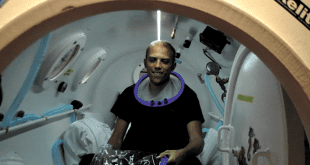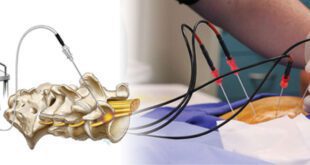By Michael Branch, MD
 Age-related hearing loss, known as sensory-neural hearing loss, is a normal part of growing older. Approximately 50% of people will have significant hearing loss by age 75 years. Preventing this type of hearing loss – through things like avoiding loud noise exposure – and treating sensory-neural hearing loss is critical for maintaining good hearing.
Age-related hearing loss, known as sensory-neural hearing loss, is a normal part of growing older. Approximately 50% of people will have significant hearing loss by age 75 years. Preventing this type of hearing loss – through things like avoiding loud noise exposure – and treating sensory-neural hearing loss is critical for maintaining good hearing.
Over the past decade studies have also shown the negative effects of hearing loss on cognitive function. Why are these disorders so closely related? When there is auditory deprivation there is a significant reduction of activity in the area of the brain that processes communication. This area is the temporal lobe and is called the primary auditory cortex. It not only controls hearing but also the way language is processed.
Individuals that struggle with hearing often become less social and therefore their cognitive decline is affected by less interaction and less mental processing. It is also thought that decline in other special senses, like the sense of smell and vision, can exacerbate cognitive issues due to degeneration in these other areas of the brain.
If you get early treatment, which is typically hearing aids, you can slow down the natural progression of hearing loss related cognitive decline. Hearing loss will continuously get worse with age in most people. But compensating for the loss with properly fitted hearing aids can help reduce mental decline. It is important to keep the brain engaged in social interaction and verbal communication. When someone becomes isolated from communication, it tends to exacerbate the processes of dementia.
Nearly 5.2 million Americans have Alzheimer’s disease, and that number is expected to triple by 2050. Experts estimate that an Alzheimer’s diagnosis will affect close to 15 million people by mid-century. There is no cure for Alzheimer’s or dementia. Taking care of our health is critical to staving off memory related decline. This includes many factors like proper exercise, staying social, staying mentally active with things like puzzles and reading, a heart healthy diet, getting proper rest and protecting our hearing. (For more information see the Alzheimer’s Association web site.)
Alzheimer’s researcher, Dr. Doraiswamy, a professor of psychiatry and medicine at Duke University School of Medicine and coauthor of The Alzheimer’s Action Plan stated that improved hearing improves brain function. He explained, “The improvement in cognition was huge, about double that seen with any of the current FDA drugs for treating Alzheimer’s.” He continued, “Studies have shown that uncorrected vision problems raise the risk for dementia. Every doctor knows that hearing loss can result in cognitive problems, but they still don’t focus on it as a priority when they evaluate someone with suspected dementia, which is a big missed opportunity. The benefits of correcting hearing loss on cognition are twice as large as the benefits from any cognitive-enhancing drugs now on the market. It should be the first thing we focus on.”
If you are experiencing any changes in your hearing, it’s important to see an Otolaryngologist because they are trained to get you the best outcome and resolution for your specific issue. There could be underlying issues for your hearing loss and multiple options to improve your hearing might be available like surgery, cochlear implants, hearing devices, or even something as simple as removing wax.
Michael Branch, M.D.
Board Certified Otolaryngologist – Ear, Nose, and Throat
Dr. Branch was born in Jacksonville and raised in Gainesville, Fl. His first love was music, playing drums in various rock and roll bands in Gainesville in the 1960s–1970s. He enlisted in the USAF in 1973 and served active duty as an operating room technician for four years. He was commissioned in the USN in 1984 and, after completing residency in Otolaryngology in 1993, served three years active duty as an Otolaryngologist in the Naval Hospitals at Orlando and Pensacola. He has been in private practice since 1996. He is married with three adult children and three adult stepchildren. He has special interests in systematic and reformed theology. He enjoys playing, writing and recording music with his bandmates in Gainesville and loves fishing with his lovely wife, snorkeling and diving.
Florida Medical Clinic
813.778.0101
Wesley Chapel
Wiregrass Multi Specialty Campus
2352 Bruce B Downs Blvd., Suite 303
Wesley Chapel, FL 33544
Zephyrhills
Eiland Multi Specialty Campus
36763 Eiland Blvd., Suite 103
Zephyrhills, Florida 33542
 Central Florida Health and Wellness Magazine Health and Wellness Articles of the Villages
Central Florida Health and Wellness Magazine Health and Wellness Articles of the Villages



